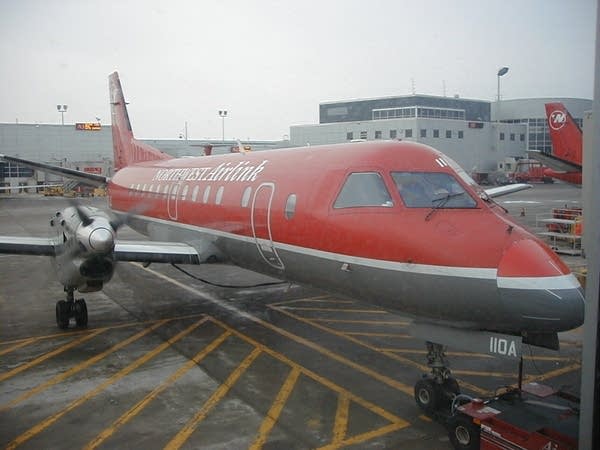Mesaba reaches tentative agreement with mechanics

Mesaba has long maintained that cutting labor costs is essential to the airline's survival -- and to preserving the jobs of its roughly 3200 employees. The bankruptcy judge overseeing the company's reorganization agreed, and recently gave Mesaba permission to impose wage and benefit cuts of up to 17.5 percent on its unions. The judge also barred those unions from striking.
Mesaba officials have insisted they'd prefer reaching negotiated agreements to imposing contract terms. And if union members ratify the three deals reached in the past week, Mesaba will have cut its labor costs without having to unilaterally cut workers' pay and benefits.
Neither Mesaba nor the mechanics union will not reveal terms of the agreements. Nick Granath, an attorney for the union, says the mechanics' deal is consistent with those reached by the pilots and flight attendants. Granath says the deal differs from terms that Mesaba would have imposed.
There isn't anything to celebrate here. This is a circumstance that is dire and bleak in the extreme.
"The tentative agreement is materially better than what would have been imposed," Granath says. "And had we not reached an agreement at this time, there's little doubt in our mind that the company would have imposed."
Create a More Connected Minnesota
MPR News is your trusted resource for the news you need. With your support, MPR News brings accessible, courageous journalism and authentic conversation to everyone - free of paywalls and barriers. Your gift makes a difference.
Mesaba spokeswoman Elizabeth Costello says coming to agreements with the unions has been a difficult and sometimes painful process. But she says the airline knows that none of its employees would want to work under terms imposed by the company.
"These agreements, while they meet the company's objectives for savings, they also address the interests of the employees, of each of the employee groups," Costello says. "And that's important as we move forward."
Costello says the cuts contained in the agreements would not only reduce Mesaba's costs, they would also give the company access to additional financing. She says a loan from a New York financing company - reportedly worth $24 depends on Mesaba first achieving a certain threshold of labor cost savings.
Mesaba flies to 88 cities in its capacity as a regional feeder carrier for Northwest Airlines, which is also based in the Twin Cities and is also bankrupt.
Analyst Doug Abbey, a partner with a Washington firm called The Velocity Group, says the agreements with union negotiators are a positive and important step for Mesaba. If the unions approve the deals, Abbey says the next hurdle for the company will come when Northwest restructures arrangements with its feeder carriers as part of its own reorganization.
"Airlines typically renegotiate their contracts, especially these days with efforts to cut costs on the part of all vendors," Abbey says. "There are deliberations taking place -- likely as we speak -- about who will be providing Airlink service for Northwest going forward."
In addition to Mesaba, Northwest is also currently using Pinnacle Airlines as a regional partner, and is starting a subsidiary airline called Compass. Abbey says Northwest could continue to use two or more feeder airlines. He says avoiding having to impose contract terms on its workers would strengthen Mesaba's position as it vies to remain Northwest's partner.
"An acrimonious relationship is not the best foot forward, as it were," Abbey says. "Consensus is clearly a much better position to be in, in negotiating with Northwest."
While Abbey called Mesaba's tentative agreements with its unions "good news" for Mesaba, Granath of the mechanics union declined to characterize the deal that way. Granath says the situation is still too grim.
"There isn't anything to celebrate here. This is a circumstance that is dire and bleak in the extreme," Granath says. "We're facing a situation where we have a bankrupt carrier that has won the right to impose. Our right to strike has been temporarily taken away. There's no sugar coating the situation that we're in." Granath says negotiators are not encouraging mechanics to vote for or against the deal. He says the union will finish voting on the contract proposal by November 28. He says the pilots and flight attendants are on a similar timetable. Mesaba has already agreed to terms with the union representing its dispatchers.
